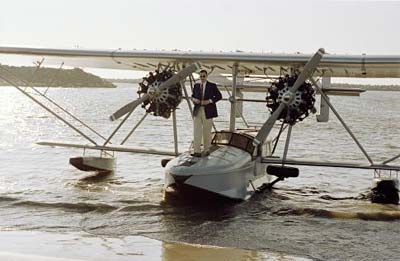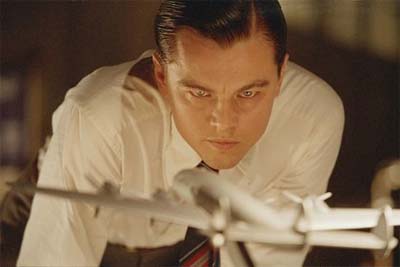The Aviator
Another Scorsese near-miss. Good, but by no means worthy of the Oscar.

Howard Hughes. What a guy. Millionaire industrialist, sometime movie producer and director, professional eccentric and, most endearingly of all, madder than a bag of piranhas. We're talking here about a man who, in the America of the 30s and 40s, weilded so much power he could influence governments, yet allegedly he died wearing tissue boxes for shoes. Ladies and gentlemen, I have a new hero. Numerous Hughes biopics have been touted around Tinseltown for years, but it has always been clear that to paint a decent picture of this man you were going to need a pretty big canvas and an artist strong enough to weild a giant brush. Step forward then Mr. Martin Scorsese, a man familiar with Hollywood excess and certainly capable of such a feat. Gangs Of New York might not have set the critics' collective ass on fire, but few would doubt Marty's credentials, and here he almost gets back on form. Almost...
Beginning with a shot of Hughes being bathed by his mother as a child, The Aviator soon sets out it's stall as a force to be reckoned with, catapulting us forward in time to the production of Hughes' 1930 biplane-centric war epic Hell's Angels. As an ice-breaker between audience and their understanding of a man whose thinking might best be described as "tangential" it works a treat. Hughes' insistence that a ceratin Mr. Mayor (of MGM fame) loan him two additional cameras to compliment the 24 he's already using to film his dogfight scene might seem like a combination of naeivity and audacity to the studio chief, but as an audience we soon understand it's neither; rather Hughe's success grew directly as a result of his logic and failed on the knife edge of his sanity.
Although Scorsese and screenwriter John Logan take great pains to ensure we understand Hughes' historical importance as a pioneer of the American and world aviation industries, it's this unbalanced orientation of the old grey matter that provides the emotional core of the movie, giving that young whippersnapper DiCaprio a chance to chew some mighty meaty role as he battles to hold a relationship with a string of Hollywood starlets. Essentially a victim of his mother's over-protectiveness, DiCaprio's Hughes makes for an impressive protagonist whose life-wrecking obsessive compulsive disorder was only ever overcome when seated in a cockpit doing insane speeds and crashing into beet fields. Unfortunately the young actor falls just short of making that vital link with the audience that the movie really requires in order for us to believe as well as understand that Hughes' apparent death wish was in fact the same spirit that discovered the New World, only now confined by a world with little left to discover.

Not that the boy hasn't done himself proud. Indeed The Aviator affords DiCaprio what is easily his best role yet, and the lad does a sterling job of seizing it with both hands. Don't go believing the hype, though, that our Leo is the new DeNiro; far from it. Although it's hard to imagine Bobby D in the role, DiCaprio could certainly do with a dose of The Master's nuance as he consistently fails to deliver on the subtleties the role requires. There's a feeling that Leo is as accomplished as it's possible to be without actually achieving greatness, and unfortunately it does detract a little from the film. Mind you, as much as the film could benefit from an injection of such minor chracter quirks, Hughes himself wasn't exactly a public purveyor of subtlety so perhaps I'm being picky.
Supporting players abound in this movie, and the wealth of talent on display is certainly an indication of the quality Logan's script and Scorcese's direction has attracted. John C. Reilly is as dependable as ever in the role of Noah Dietrich, Hughes' personal advisor and the man closest to his trust. Much of the audience's sympathy for DiCaprio's character is anchored in Reilly's performance as he struggles to reason with a dear friend who he watches dash himself against the rocks of insanity. "Well go make it!" DiCaprio tells him when Dietrich informs his taskmaster they simply don't have 18 million dollars at their disposal, and in his reactions to frequent frustrations like this Reilly imbues not only his own character but also that of hughes with a much needed air of sympathy and, increasingly importantly among the rows of urine-filled milk bottles and discarded handkerchiefs, dignity.
Of all Hughes' lovers it's Cate Blachett (spare me) who eats the most screen time as Katharine Hepburn. This will now be my statutory "ranting" paragraph. Cate Blanchett is not an actress, she's a caricature artist at best, and that is exactly what she delivers here; a very good carricature of Katharine Hepburn. What she does not do is imbue her role with any kind of emotional credibility, serving little purpose other than to give DiCaprio someone to bounce off once in a while. Her sprightly portrayal of Hepburn is itself like a decent Hepburn performance rather than a window on the woman herself, and as such it's totally out of character with the rest of the film and her fellow performers. Fortunately she serves some purpose in the introduction of her family shedding some insight on Hughes' moral stance on wealth, but any emotional content is left to Kate Beckinsale and Kelli Garner as Ava Gardner and faith Domergue respectively, and fortunately for us all they cope with it a sight better.

Standout stuff too from the resurgent Alec Baldwin as Juan Trippe, founder of Pan Am and foil to Hughes' vision of a world brought closer by cheap, safe air travel. In an unusually understated performance (although guess who makes use of the BBFC's promised "single use of strong language") Baldwin bubbles a deep, buried menace that rarely becomes visible but always feels undeniably present, giving a human face to the element of danger Howard seemed so frequently to tango with. Alan Alda too proves similarly insidious as slippery Senator and Pan Am payroll skimmer Ralph Owen Brewster, the man who pulled Hughes in front of a public hearing in an attempt to disgrace him and protect Trippe's interest in the international aspect of air travel. Yes sir, there's certainly a hell of a lot of thespian talent on display here...
Disappointing, then, when I say that yes, I think The Aviator is a better movie than Gangs but no, it isn't anywhere near the director's best. All the more annoying for me to agree with the critics then who say this is Scorsese's best chance for an Oscar yet. This is entirely true, but not for the reason that it's his best movie, rather that it's his most accessible, family-friendly outing to date. If Goodfellas was too much of an aggressive, balls-out "f**k"-fest for the Academy to validate then The Aviator is exactly the opposite; a movie that feels like it was designed to collect awards, and correct me if I'm wrong but since when was Scorsese so concerned about public displays of industry acceptance?
One gets the feeling that this is Scorsese's "fold" in the great game of awards poker when he should be grabbing his balls and going all-in. Has that evasive Oscar finally eaten away at him so much that he'd rather concede to studio conformity in order to bag one than continue, like Hughes, to fly by the seat of his pants and do things his own way? Or does The Aviator genuinely represent the direction our Marty would like to be going in? I may well be wrong but I fear I'm not. There are certainly flashes of near-breathtaking genius to be found scattered here and there, but nothing in the remainder of the movie lives up to the early promise of the Hell's Angels dogfight scene, and what we're left with is a very, very competent picture rather than a great one. Just like Hughes' mothballed military aircraft the Hercules, The Aviator certainly has wings, but it only ever takes off long enough to prove that it actually can.
Cate Blanchett (Katherine Hepburn)
John C. Reilley (Noah Dietrich)